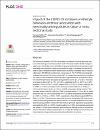Impact of the COVID-19 lockdown on lifestyle behaviors and their association with personality among adults in Qatar: A cross-sectional study
| المؤلف | Al-Abdi, Tamara |
| المؤلف | Heraclides, Alexandros |
| المؤلف | Papageorgiou, Alexia |
| المؤلف | Philippou, Elena |
| تاريخ الإتاحة | 2023-09-20T08:47:08Z |
| تاريخ النشر | 2022 |
| اسم المنشور | PLoS ONE |
| المصدر | Scopus |
| الرقم المعياري الدولي للكتاب | 19326203 |
| الملخص | The coronavirus pandemic (COVID-19) resulted in lockdowns and social distancing measures enforced by governments around the world. This study aimed to identify changes in adherence to the Mediterranean diet (MD) and physical activity (PA) and associations with personality during lockdown. Using a cross-sectional design, a convenient sample of 543 adults in Qatar completed an online questionnaire consisting of validated tools to measure adherence to MD (MEDAS questionnaire, score ranges 0-13), PA (IPAQ, assessing light, moderate high intensity PA) and personality (BFI-10, categorizing individuals' personalities). The majority of the participants were female (89%), aged between 21 and 29 years (45%). The overall MD adherence decreased during lockdown (5.9 vs. 6.1, p < 0.001). There was an increase in olive oil (9% vs. 12%; p < 0.001), vegetables (54.3% vs. 58.7%; p = 0.005), legumes (11.8% vs. 15.3%; p = 0.007), sofrito (70.9% vs. 77.3%; p < 0.001) and fat (45.9% vs. 53.8%; p < 0.001) consumption and a decrease in fresh fruit (39.4% vs. 15.8%; p < 0.001) and fish/seafood (5.9% vs. 3.9%; p = 0.0035) consumption during lockdown. Met-min/week values of total PA (1330.5 vs. 1836.7), vigorous activity (711.5 vs. 867.4), moderate activity (208.3 vs. 301.3), and walking (410.7 vs. 668.0) all decreased during lockdown (p < 0.001, p = 0.010, p = 0.010 p < 0.001, respectively), while sitting increased (3837.3 vs. 2896.4 p < 0.001). The extraversion personality dimension had a higher MD adherence (p = 0.039) compared to agreeableness before lockdown. No changes in MEDAS scores were observed during lockdown in those with high levels of openness. Openness was positively associated with all PA (p = 0.027), including walking (p = 0.026), and negatively associated with sitting (p = 0.038) before lockdown, while participants with high scores for neuroticism were less likely to be sitting during lockdown (p = 0.042). The findings can be used to guide the development of appropriate personality-tailored lifestyle interventions. |
| راعي المشروع | The publication of this article was funded by Qatar National Library. The authors would like to extend their gratitude and acknowledgments to all study participants and to Asma Jamil and Rawan Jomat for their technical assistance with the study. We thank Dr. Tara Desjardins for her kind proofreading and editing of the manuscript. |
| اللغة | en |
| الناشر | Public Library of Science |
| الموضوع | Communicable Disease Control COVID-19 Cross-Sectional Studies Female Humans Male Personality Qatar |
| النوع | Article |
| رقم العدد | 11-Nov |
| رقم المجلد | 17 |
الملفات في هذه التسجيلة
هذه التسجيلة تظهر في المجموعات التالية
-
أبحاث فيروس كورونا المستجد (كوفيد-19) [924 items ]
-
التغذية البشرية [475 items ]


